|
Multa fidem promissa levant, ubi plenius aequo
Laudat venales qui volt extrudere merces. [1]
1 He who overpraises the goods he wishes to dispose
of; shakes our confidence by his lavish promises.—Horace, Ep. ii. 2. 10.
He sinks in credit who attempts to raise
His venal wares with over-rating praise,
To put them off his hands. Francis's
Translation.
So wrote Horace, and a later cynic pronounced
promises to be like pie-crust--made to be broken. But there are promises
and promises, and an Institution which has made upwards of one hundred and
forty-six thousand promises and has never failed in fulfilling any one of
them, may be held entitled to the confidence of its members and the
public.
Such is the record of the SCOTTISH WIDOWS' FUND LIFE
ASSURANCE SOCIETY, the oldest life
office in Scotland. [The Hercules Fire Office
undertook life assurance in Edinburgh in 5809, but gave it up after a very
brief experience. In a publication by the Edinburgh Life Assurance Company
in 1908 it is claimed for that honourable corporation that it is "the
oldest office transacting life assurance, endowment and annuity business
alone—without fire, marine or other risks —which affords the additional
security of a substantial capital (£500,000)." It is to be noted that,
while this is quite consistent with the fact that the Scottish Widows'
Fund is the oldest life office in Scotland, a dividend has to be paid to
shareholders in the above capital of half a million sterling, whereas in
the Scottish Widows' Fund—a purely mutual society—there are no
shareholders and the whole profits are divided among policy-holders, whose
security rests, not on shareholders' property, but on their own invested
funds of £21,000,000,] which, since its foundation one hundred years ago
has issued upwards of 146,000 policies of assurance, and has met every
obligation arising therefrom.
A good deal of wisdom is sometimes compressed into
pithy saws. "Gang forward!" is a gallant motto, long since adopted by the
Stirlings of Keir; but "Gang warily!" is a wiser one, appropriated by the
Drummonds; and it was in that spirit that Scottish men of business acted
in the matter of life assurance. During the closing years of the
eighteenth century, when assurance companies were rising like mushrooms in
London, and, with few exceptions, perishing as quickly, our Scottish
forebears were quietly biding their time, accumulating knowledge from the
experience of their more venturesome fellow-subjects in the south.
It did not, however, escape the observation of
certain shrewd minds that the agents of English assurance companies on a
proprietary basis had become pretty busy in Scotland and were securing a
considerable amount of business. The attempt in 1809 of the Hercules
Society to undertake life assurance in Edinburgh, and its failure, were
not conclusive as to the possibility of establishing in Scotland an
institution similar to the Equitable, whereof the soundness and success
could not fail to be recognised [The Equitable Society was established
under the name of the Society for Equitable Assurances on Lives and
Survivorships. Although it was the first office to graduate premiums
according to the age of insurers, for very many years after it began
business it took lives without medical examination or certificate.
Candidates for assurance appeared before the Board, who questioned them
"as men of the world" ; and the success of the Society was proof that this
method was satisfactory.] for the Hercules was a proprietary concern, and,
when it abandoned its essay in life assurance, continued to conduct its
fire business in a manner profitable both to shareholders and clients.
The credit of initiating a movement for the
establishment of a Scottish society was due to Mr. David Wardlaw, writer,
of Gogar Mount, who, in co-operation with Mr. Patrick Cockburn, drew up a
prospectus and "Plan of the Regulations" in 1811. This was submitted on
25th March 1812 to a small gathering of gentlemen who had been induced to
take an interest in the proposal, in the Royal Exchange, Edinburgh.
Mr. John Francis Erskine of Mar was called on to
preside, and the following gentlemen were nominated a Committee "to make
such enquiries and investigations as they shall find necessary for
enabling them to report to an adjourned meeting such regulations and
tables as they shall think proper to be adopted in commencing the
Institution "


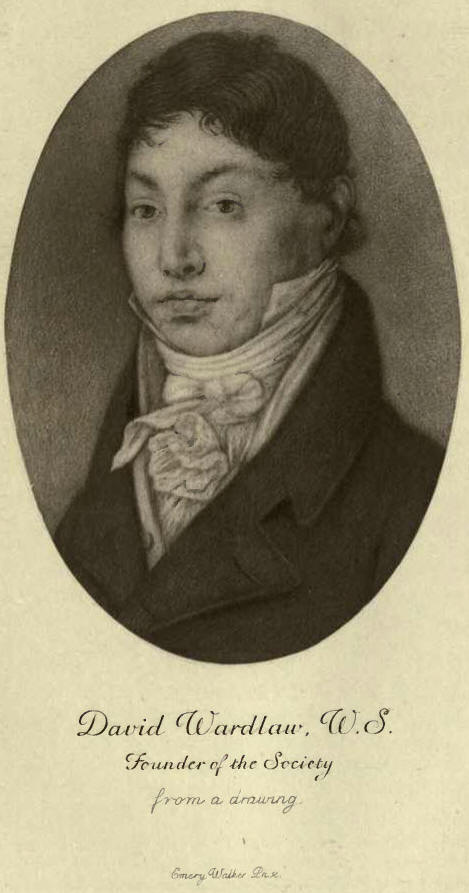
This Committee held meetings on 6th and 21st April ;
and on the latter day, having obtained the opinion of the
Solicitor-General and Mr. Cathcart that the articles of a draft prospectus
which was before them would be "sufficient to exclude any risque of
general liability of members of the Society," they drew up an amended
prospectus, directing that it should be printed and circulated among "all
the principal towns and populous districts in the country and to all the
clergymen in Scotland, both of the Establishment and Secessions."
The prospectus was prefaced by the following
statement, setting forth the object and scope of the proposed Society.
The beneficial effects of the establishment for
making provision to Widows of the Clergy of the Church of Scotland have
been long felt and acknowledged, and have given rise to similar
institutions, which have also been attended with the most salutary
consequences; but all these being confined to particular districts,
societies, and corporations, it has occurred to some gentlemen in
Edinburgh to propose the formation of a General Society, with similar, but
more enlarged, views, the benefit of which may be extended to all parts of
the United Kingdom.
This proposition being highly approved of, and
patronised by some of the most eminent characters, the following plan has
been prepared, and is now humbly submitted to the consideration of the
Public.
It is unnecessary to dwell on the general advantage
of institutions which are calculated, by a small annual sacrifice when
persons are best able to spare it, to rescue from probable want and
dependence those beings whose permanent comfort every good man feels it to
be one of the first objects of his existence to secure.
Those who are unable to set apart such a portion of
their incomes as will afford, after their deaths, suitable annuities to
their widows or other dependent relations, have the satisfaction, by
joining such institutions, to feel that this great object is attained;
while the rich are saved the necessity of laying aside and securing
capitals for jointures or annuities, and enabled to leave them their
estates in so far clear and unembarrassed with what so frequently
happens—a tedious, troublesome, and expensive trust-management.
The principle of the proposed Institution is to take
from contributors no more than what, according to the most approved
calculations, is sufficient, by careful accumulation of the funds, to
afford the annuities contracted for, excluding any idea of proprietorship
or advantage to particular individuals; and it will be a fundamental rule
that the whole business of the Society shall be managed by persons
deriving their appointments from the free choice of the Members
themselves.
Among the rules drawn up by the Committee a few
points which are of interest at this day may be recapitulated.
Under Rule II. it is provided "that the Association
shall comprehend ALL RANKS." Unmarried men might nominate at their
admission "sisters or other females, who shall be considered on the same
footing as wives in respect to this establishment."
Profane persons might construe the privilege thus
offered to bachelors in regard to "other females on the same footing as
wives" in a sense very different from that contemplated by the reverend
chairman and the serious citizens composing his committee; but—Honi soit
qui mal y pense!
Rule III. sets forth that "any Member may secure
annuities to different Females, not exceeding, in whole, £500 a year on
the life of one Member, beyond which it is not proposed at present to go."
Rule IV.—No person to be admitted a Member who is
above sixty years of age, or whose wife is more than twenty years younger
than' himself. Presumably this limitation was intended to apply also to
the "different Females" provided for under Rule III.; anyhow the Directors
took power, "in all cases, to refuse applications of proposed Members
without assigning reasons." This was made all the easier by Rule V., which
laid down that Members were to be admitted by the Directors voting by
ballot, one blackball in three excluding a candidate.
Rule VII.-"The Widows of persons committing suicide,
falling by the hand of justice, or dying on the seas (except in His
Majesty's packets passing between Great Britain and Ireland) shall only be
entitled to annuities corresponding to the value of the interest of their
husbands at the time of their deaths."
Surrender values were provided for under Rule XXII.,
which empowered the Directors, "for behoof of the Society, to buy up the
interest of any of the Members wishing to dispose of the same, in whole or
in part"; and under Rule XXVIII. it was ordained that "if, in process of
time, it shall appear that the Society shall have acquired a capital more
than sufficient to uphold its credit, as well as to satisfy all claims
that may come against it, the Members shall participate of the benefits
thereof in proportion to their interests in the fund."
It will be noted that these rules were drawn up so
as to provide for annuity business only; but in a note appended to them it
was stated that it was in contemplation so to frame the Articles of
Constitution as to extend the scheme to include endowment and the payment
of capital sums on the death of members. "But," continues the note, "as it
is not thought expedient to commence with all these branches at once, the
execution of that for insuring capital sums will be postponed, or limited
to small sums for a certain time, with power to the Directors to defer it
for a longer time, if they shall think proper."
Specimen tables, drawn up by Mr. Patrick Cockburn,
accountant, and founded on the Northampton tables of probability, were
submitted through Lord Primrose to Mr. Morgan, actuary of the Equitable
Society, for revision, to be circulated with the prospectus.
The note contained an invitation to the public to
consider the proposed scheme, and communicate any observations thereon to
Messrs. Gibson, Christie, and Wardlaw, or Mr. William Wotherspoon, and
concluded with the reminder (prudent in days when postage fees were heavy
and had to be defrayed by the addressee) "Letters on this business are
expected to be post paid."
Hitherto all existing assurance offices had based
their calculations on the Northampton tables of mortality, reckoning.
interest at 3 per cent. Mr. Patrick Cockburn, however, to whom was
entrusted the task of framing annuity tables for the nascent Society,
while adopting the Northampton tables, calculated the value of money at 4
per cent and added a fractional sum to the price of annuities to meet the
expenses of management.
Moderate as was the language of the prospectus, and
modest the scope of the undertaking described therein, there was something
to inspire awe in the list of "eminent characters" whose countenance the
Committee secured and whose support they hoped for. Indeed the names
associated with the enterprise and circulated with the prospectus were so
numerous and so august as might have suggested some risk of overcrowding
the quarter-deck of the craft about to be launched.
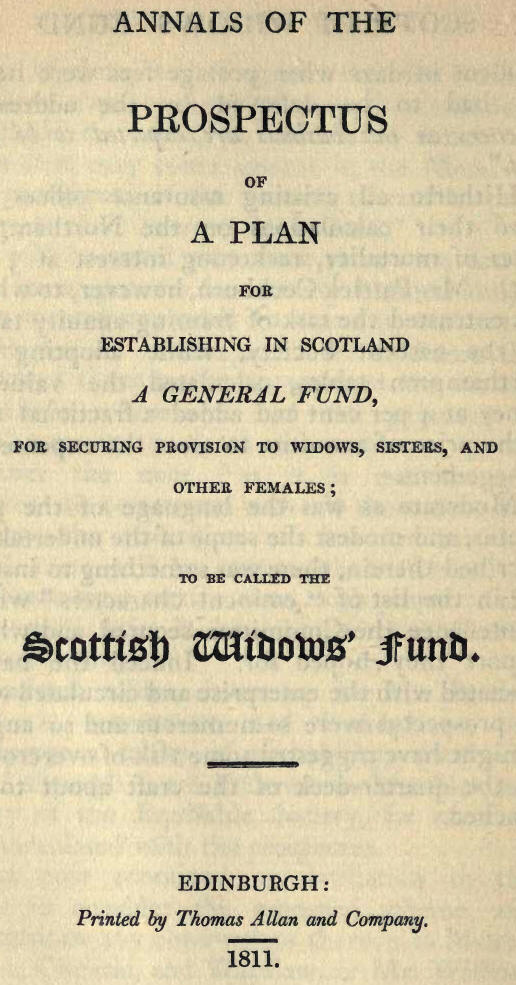
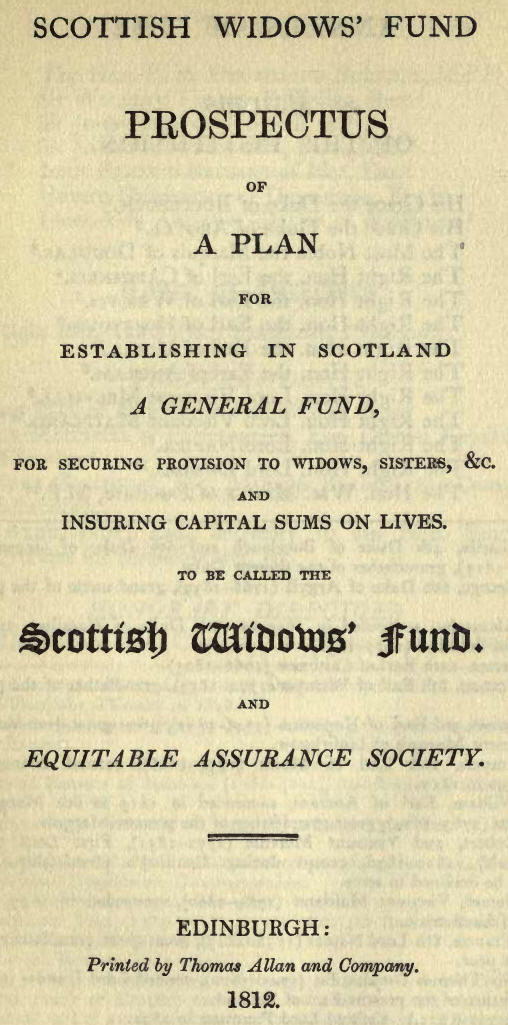
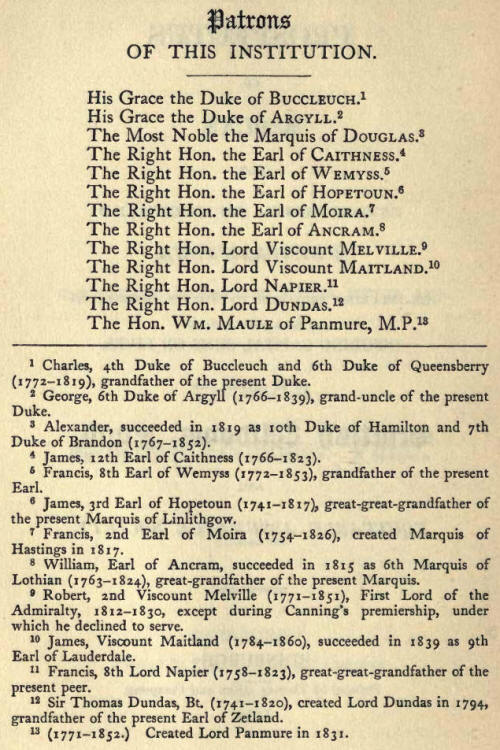
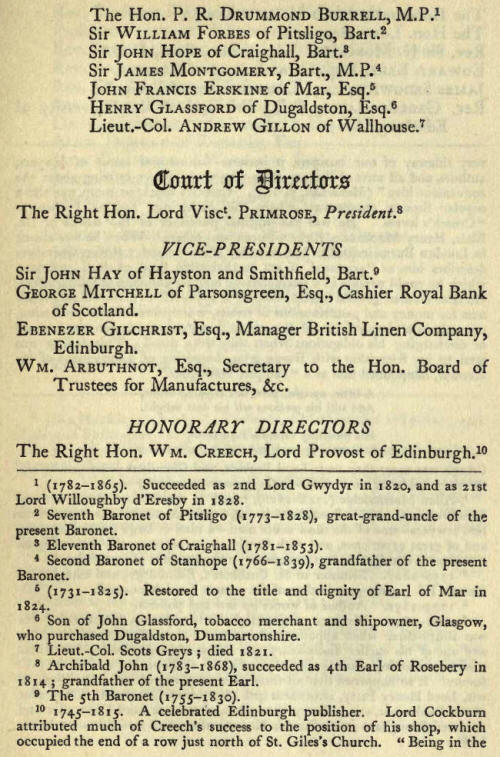
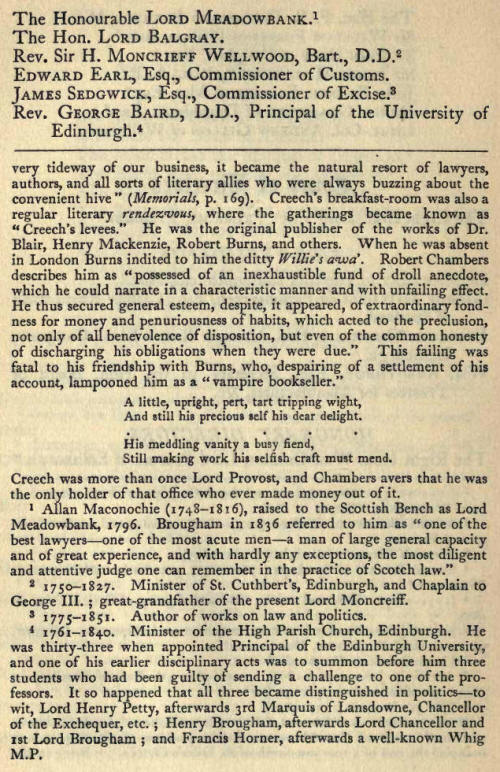
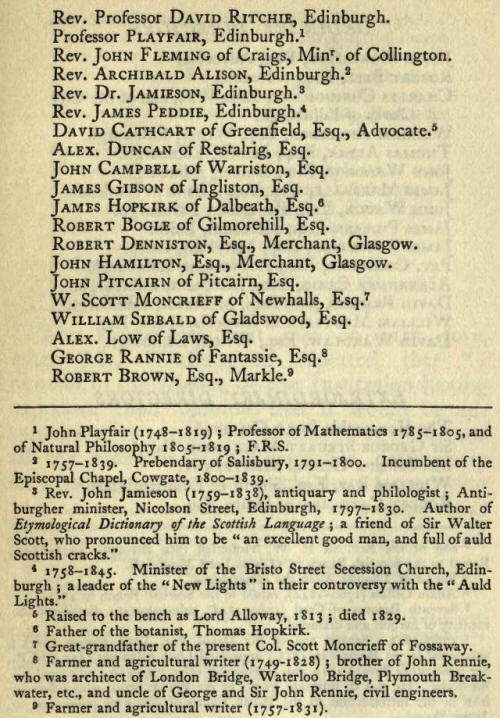
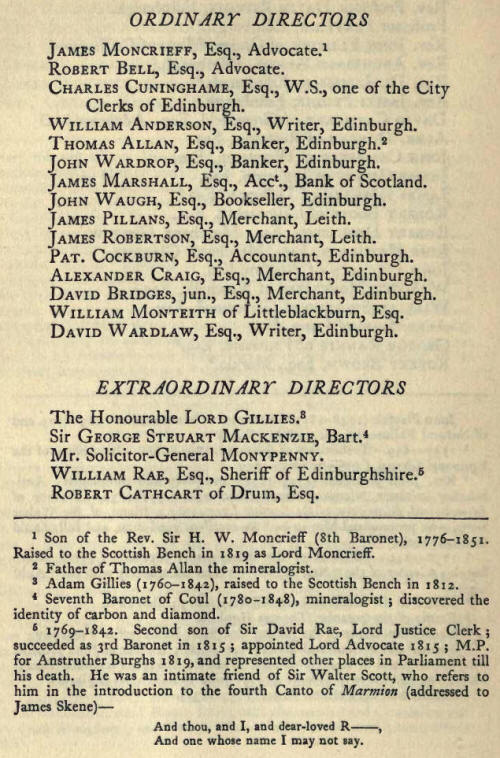
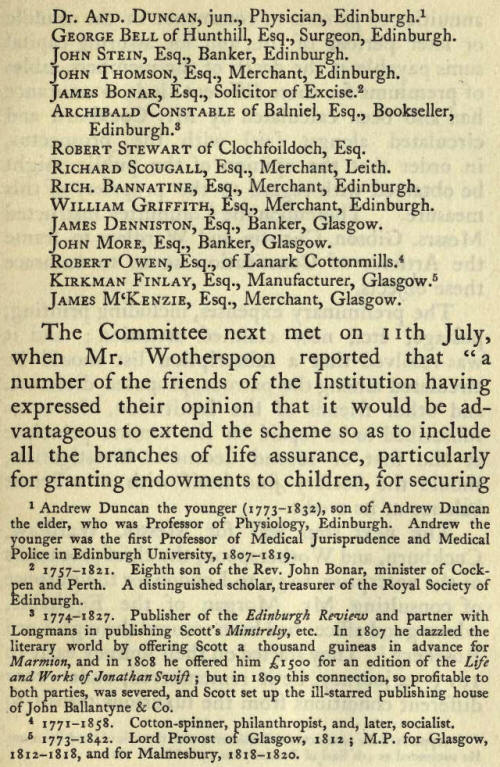
annuities to persons to commence in the middle or
later periods of life, and for assuring capital sums payable at the death
of the members, tables of premiums for these different kinds of assurance
had also been calculated by Mr. Cockburn and circulated alongst [sic] with
the prospectus, in order that the opinion of the public might be obtained
with regard to the propriety of this measure." Thereupon the Committee
instructed Messrs. Gibson, Christie, and Wardlaw to frame the Articles of
Constitution so as to embrace these objects.
The preliminary expenses, including printing,
postage, etc., now claimed attention ; and it was resolved that a
subscription list should be circulated among the patrons, proposed
directors, and other friends of the Institution, the sums subscribed to be
repaid on the tontine principle at the first or second decennial
investigation, should the Society find itself with a sufficient balance at
its credit.
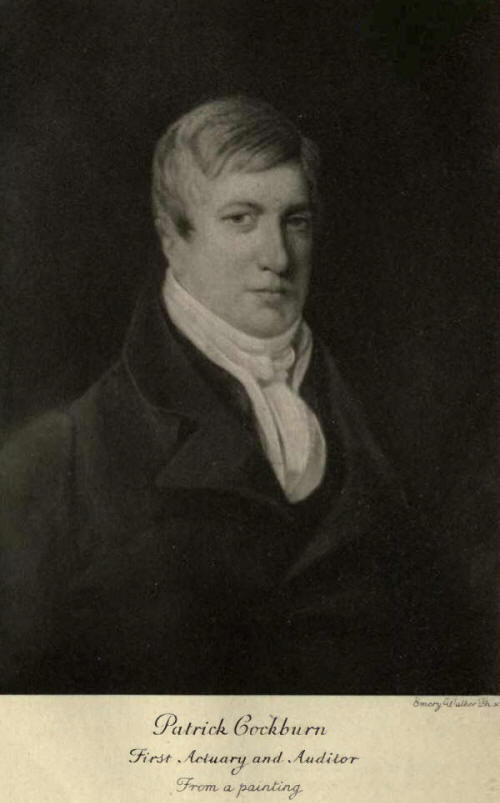
The next step was for Messrs. Wardlaw, Cockburn, and
Wotherspoon, the chief promoters of the enterprise, to go to London for
the purpose of consulting Mr. Morgan of the Equitable, whose good offices
had been secured through Lord Rosebery. [Appears in the pro' pectusas
President under the title of Lord Primrose. He succeeded as 4th Earl of
Rosebery on 25th March 1814.] They started on their journey early in
1813—a journey, be it remembered, under very different conditions from the
luxurious transit to which the present generation are accustomed. John
Loudon Macadam had not yet exercised his magic on the North Road; none but
heavy stage coaches could travel on that unmetalled highway, and even if
the deputation travelled by post-chaise, the journey from Edinburgh to
London occupied four or five days. However, it proved well worth the time
and expense; Mr. Morgan put his unrivalled experience freely at the
disposal of the travellers, certified Mr. Cockburn's tables as sound, and
carefully revised the draft articles of constitution.
More than a year passed before the Committee met
again. The truth is that, despite the imposing array of patrons and
officials, honorary and executive, whose names had been published with the
prospectus, the Scottish public had showed no signs of being enamoured of
the scheme; so that at a general meeting of "the friends of the proposed
Institution, to be called the Scottish [sic] Widows' Fund and Life
Assurance Society," held in the Royal Exchange on 6th July 1814, the
Committee had to report that they had been able to raise no more than £248
: 17s. 10d defray preliminary expenses, which was quite inadequate for the
purpose. [Further subscriptions raised the amount to £375 : 18s., which
was repaid to the subscribers at the first investigation in 1825.] This
discouraging circumstance notwithstanding, the meeting (number present not
recorded) unanimously resolved to go forward, and an
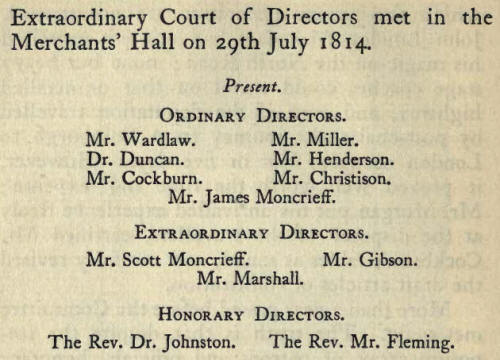
Dr. Johnston having been called to the chair, it was
in keeping with the spirit alike of the age, of the nation, and of a city
whose pious motto is Nisi Dominus frustra, that he opened the proceedings
with prayer. The first resolution submitted was passed unanimously,
declaring that the Society was now formed and that the directors were
ready to undertake their duties. At a subsequent ordinary meeting of
directors held on 6th March 1815 it was resolved that, in order to prevent
any disputes that may afterwards arise as to the period of the
commencement of the Society, according to which the periods of
investigation will be afterwards regulated," a standing order should be
enacted that the Society commenced on the 2nd day of January 18 15 (the
1st January being a Sunday), and that the first period of investigation
and distribution of surplus should be on 1st January 1825 or the first
lawful day thereafter.
This resolution having been confirmed by an
Extraordinary Court on the ist May following, it may be argued that the
2nd January is the right anniversary of the Society ; but, although it is
within the power of an Extraordinary Court to rescind one of its own
resolutions, it cannot annul a fact;
Not Jove himself upon the past hath power;
wherefore the true historic natal day of the
Scottish Widows' Fund Life Assurance Society must be held to be 29th July
1814, although for administrative purposes the anniversary falls on ist
January. August analogy to this duplicate observance may be found in the
official date of the Sovereign's birthday, which does not always coincide
with the day of his birth.
It was also at this Extraordinary Court of 29th July
1814 that Mr. Wotherspoon is first mentioned in the minutes as Manager. He
was called on to find security for the sum of £500.
On 19th September 1814 Mr. Wardlaw applied for a
policy of assurance for £1000 payable at his death, Mr. Cockburn for a
similar one of £500, and the proposals of these gentle-men were accepted
on ioth October following. A number of other policies were issued before
the close of the year, whence it is evident that the Society was in active
existence for five months before its official birthday.
Mr. Morgan of the Equitable Society, having
considered the proposed tables afresh, wrote on 20th September expressing
the opinion that single premium payments, endowment assurances, and
deferred annuities would not be much in request. "The less of this
business you have the better, for if you gain money on one kind of
assurance in consequence of the probabilities of life being higher than
the Tables make them, you must lose in proportion by those assurances
which are advantageous only in proportion as the probabilities are lower
than the Tables make them."
Before receiving Mr. Morgan's letter the directors
had resolved that io per cent be added to the contributions of persons
subject to gout. The Equitable charged ii per cent extra for gout, and the
same for not having had smallpox. "Gang warily" still continued to be the
axiom of the directors, and on 31st October they determined that, until
the funds of the Society should amount to £3000, in the case of any
assurance over £500 being effected upon a life, the amount in excess of
that sum should not be exigible until five years after the date of the
policy, the balance unpaid carrying interest. On 19th December it was
resolved that "in the infant state of the Society it should avoid any
risque of more than common hazard," but recommended that efforts be made
to obtain such data as would enable them to assure persons going outside
Europe, and military and naval men, on terms proportionate to the extra
risk.
Although the Scottish Society was avowedly framed on
the lines of the Equitable, there was a certain divergence between the
immediate aims of the two institutions ; for whereas the Equitable dealt
primarily and almost exclusively with life assurance pure and simple, the
dominant purpose of the founders of the Scottish Society was to raise a
fund securing annuities to the widows of its members. Life assurance only
came to be contemplated as a subsidiary supplement to what was intended to
be the main business, and this was clearly indicated in the title
"Scottish Widows' Fund and Life Assurance Society"; but it very soon
became apparent that the annuity branch of the concern was to be far
outstripped by the assurance of capital sums on lives. Yet the old name,
shortened colloquially into "Scottish Widows," still remains unchanged
—long may it so continue! though one may smile sometimes when some
Englishman, who has neither perpetrated, nor doth contemplate, matrimony,
speculates vaguely on the relevance of the title ; just as one may hear
uninstructed comment upon the name British Linen Bank, an institution
which assuredly has nothing flimsy in its constitution.
It probably cost the founders of the Scottish
Society many an anxious thought when they saw the bulk of their business
flowing from the first into that channel which they had designed as the
less important of the two. They had adopted as a cardinal principle the
mutual system which the Equitable Society had carried to such signal
success, and they had calculated on being able to accumulate a fund by the
sale of annuities. But it soon became evident that they would have to rely
chiefly upon annual premiums on life assurance for building up that fund—a
slow process which might be swamped by the emergence of a heavy claim or
claims before there was enough money at the Society's credit to meet the
same. It was doubtful whether the banks would allow an overdraft upon the
accounts which had been opened; for, as a mutual institution whereof each
member was liable for no more than his covenanted contribution, they had
no share capital—no guarantee from a body of proprietors such as the
managers of a proprietary office might fall back on. Howbeit, fortune
smiled upon the enterprise ; no claim for a capital payment emerged until
the Society had been doing business for eighteen months, and the critical
early months were passed in safety. |

